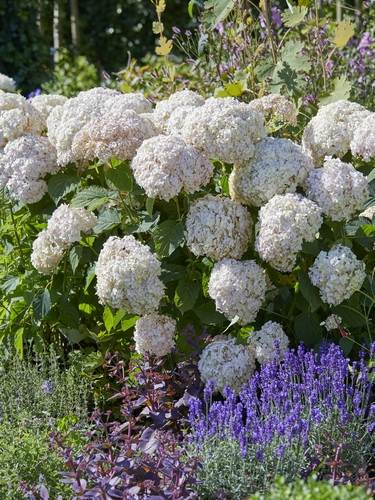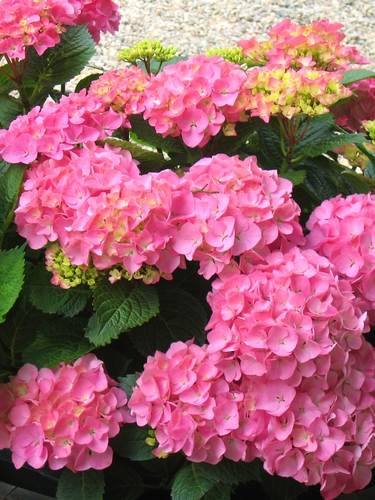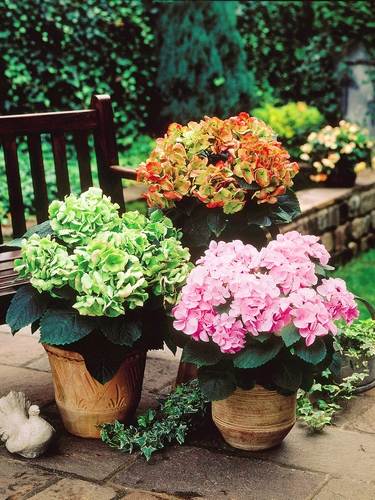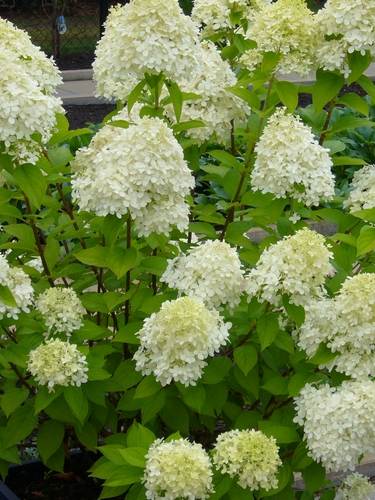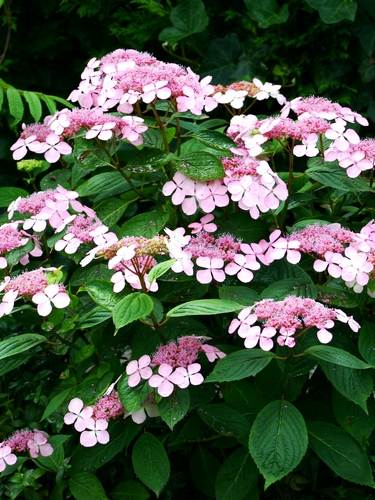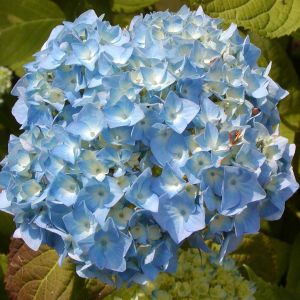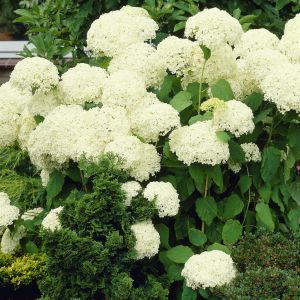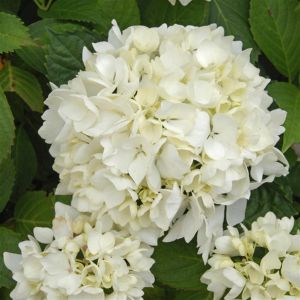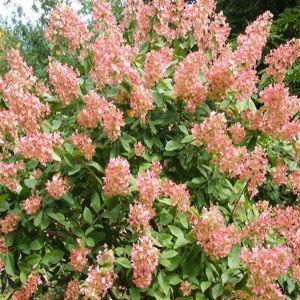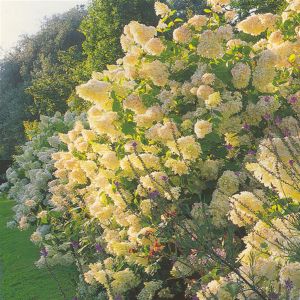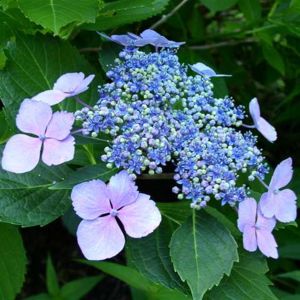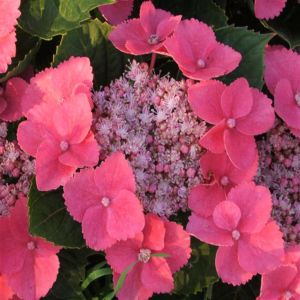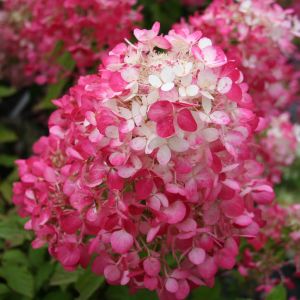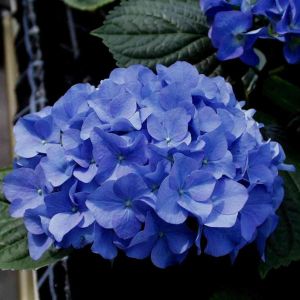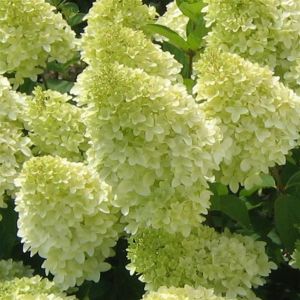Hydrangea
A hydrangea cannot be missed if you want to create the real cheerful garden. Hydrangeas come in all shapes, colours and sizes and you can choose from a hydrangea arborescens to a hydrangea macrophylla. If you want a paniculata hydrangea, we have many varieties. We sell hydrangeas directly from the grower, always super fresh!
Hydrangea shrubs add grace, stature and depth to mixed borders
Philibert Commerson discovered Hydrangea in China during 1767! Since then many different varieties have been created. Hydrangeas like an acid soil for best results, so apply plenty of peat containing compost whilst planting. When growing Hydrangea, you may want to test the pH of your soil so that you will be sure of what flower color will emerge. In soil with a pH greater than 7.0, hydrangea will be pink; in soil with a pH less than 7.0, the blossoms will be blue.
There are various Hydrangeas varieties available such as the Hydrangeas paniculata types, the Hydrangeas macrophylla types, Hydrangea serrata, Hydrangea sargentiana and Hydrangeas aspera types.
How to care for Hydrangea
Hydrangea's flower from early summer to the first frost and have a compact growth except for the variety Annabelle that will grow up to 1.5 mtr in one season.
hydrangea requires a moist retentive Soil that is enriched with organic matter. Choose a sheltered position against a wall or under a tree but avoid Hedges. Add peat at time of planting & water well. Protect against severe frost in winter. Do not remove dead flower heads - leave them on through the winter as they help protect the plant from frost. Cut back in spring by removing dead or diseased branches down to the first Healthy bud. In spring feed established plants with a fertiliser and apply a thick layer of mulch for protection of the roots.
How to prune the hydrangea
Most macrophylla and serrata species thrive on old wood, or steals that have grown last year. If you cut back these species in the spring, you also cut out all the flowers. If strong pruning is not necessary you can better prune back a third of the branches to 20 to 30 cm above the ground each year, the other branches then give enough flowers. Because the buds of these species are formed early in the spring, they are sensitive to night frost. The old flowers can therefore best be left untill the beginning of March, because that gives some protection.
Hydrangeas that bloom on new wood are the paniculata and the arborescens. These can be pruned back to about 30 cm each year. They will return strongly every year with the right fertilization. Especially the arborescens species such as Annabelle give such large flowers that some support is sometimes desirable because otherwise the stems (especially after rain or strong wind) can collapse under the weight. We have the correct plant supports in stock for this. These green supports do not or hardly reappear in the course of time. Hydrangea Annabelle strong is a new variant with a stronger stem, that does not work and there is also a pink variant known, the Invincibelle Spirit.
Buy all your garden plants at Gardens4You
You can buy Hydrangea quickly and easily at your online garden center. Pay your hydrangeas easily afterwards and not good money back. Large range of Hortensias to choose from directly from the nursery.
On all our Hydrangea shrubs you get standard bloom guarantee, if you are not satisfied you get new plants or your money back. So you can order with peace of mind. We have the best quality bushes.
Also take a look at our other bushes. Such as the very popular rhododendron and butterfly bush.
Hortensia: The Ultimate Guide to Planting, Care, and Maintenance
Hortensias, also known as hydrangeas, are a popular garden plant known for their large, fluffy blooms that come in a variety of colors. These versatile plants can be used in many ways, from accenting a mixed border to creating a standalone focal point in a garden bed. With proper planting, care, and maintenance, hortensias can thrive in gardens for many years.
Planting Hortensias
When planting hortensias, it's important to choose a location that provides partial to full shade and well-drained soil. The ideal pH range for hortensias is between 5.5 and 6.5, but they can tolerate a wider range of pH levels. Before planting, amend the soil with organic matter such as compost to improve drainage and fertility. When planting, be sure to plant the hortensia at the same depth it was in the container and water thoroughly.
Care and Maintenance
Hortensias require regular watering, especially during dry spells. The soil should be kept consistently moist but not waterlogged. Fertilize hortensias once a month during the growing season with a balanced fertilizer. Prune hortensias in late winter or early spring, before new growth begins. Remove any dead or damaged wood and shape the plant to your desired size and shape.
Common Problems
Hortensias are generally hardy plants, but they can be affected by pests such as aphids and scale, and diseases such as powdery mildew. To prevent these issues, make sure to provide proper care, including adequate watering and good air circulation. If you do notice pests or diseases, treat them promptly with an appropriate pesticide or fungicide. Regularly inspecting your hortensias can help you catch any issues early on, making them easier to treat.
Benefits of Hortensias
Not only are hortensias beautiful plants, they also have many benefits. They are easy to care for, and they attract pollinators such as bees and butterflies to your garden. They also make great cut flowers and can be dried for arrangements. They can add a touch of elegance to any garden or landscape and are a great addition to any garden enthusiast's collection.
In conclusion
Hortensias are a beautiful and versatile addition to any garden. With proper planting, care and maintenance, hortensias will thrive in your garden for many years. By following the tips and guidelines outlined in this guide, you will be able to enjoy the beauty of hortensias in your garden for years to come.
